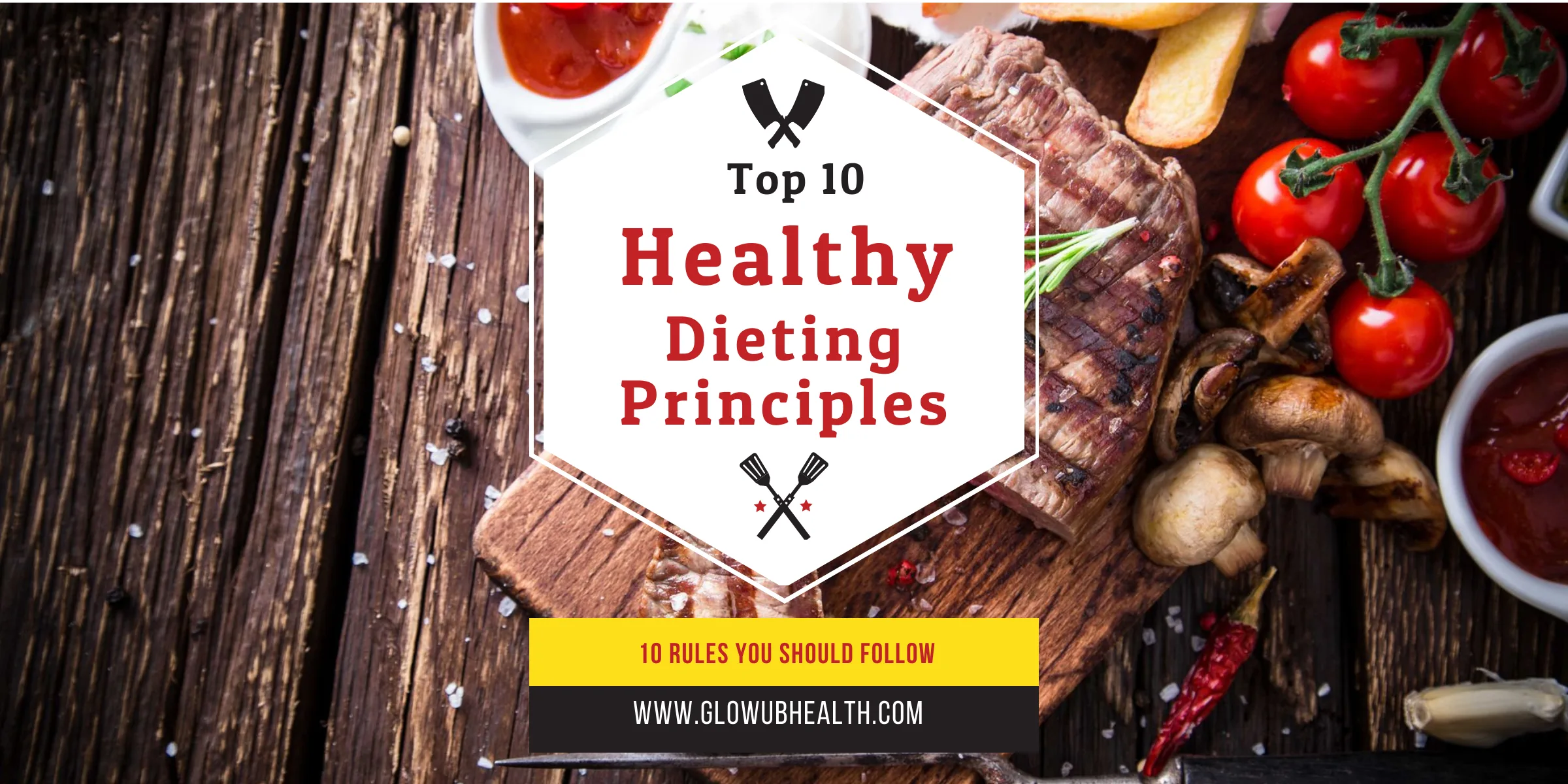Healthy Dieting Principles: Top 10 Rules You Should Follow
Healthy dieting isn’t about strict rules or skipping your favorite foods—it’s about creating a lifestyle that supports your body and your long-term well-being. Too often, “dieting” gets a bad rap, bringing to mind restrictive meal plans and constant hunger. But in truth, healthy dieting is simply about balance—eating to nourish yourself while still enjoying the process.
In this guide, we’ll walk through 10 essential rules that make up the core of a truly healthy diet. Whether you’re trying to boost your energy, shed a few pounds, or just feel more vibrant day to day, these simple, sustainable principles can help you build a stronger foundation for a healthier life.
This article is for informational purposes only and does not constitute professional medical or nutritional advice. Always consult a qualified healthcare provider or registered dietitian before making significant changes to your diet or health routine.

What Is Healthy Dieting?
Healthy dieting is the practice of consuming foods and nutrients that optimize physical and mental well-being. Unlike restrictive diets, which often lead to burnout or nutritional deficiencies, healthy dieting focuses on balance, moderation, and variety.
By incorporating nutrient-dense foods, managing portion sizes, and staying hydrated, you can create a sustainable lifestyle that supports your goals.
This guide will break down the top 10 principles of healthy dieting, offering actionable tips, practical examples, and inspiration for every step of your journey.
1) Embrace Balanced Nutrition

A healthy diet isn’t about cutting out entire food groups; it’s about incorporating a variety of nutrients that your body needs to thrive. Each meal should include:
- Fruits and Vegetables: These provide vitamins, minerals, and antioxidants. Aim for a rainbow of colors on your plate to maximize nutritional benefits.
- Protein: Lean meats, fish, tofu, beans, and eggs provide essential building blocks for muscles and tissues.
- Carbohydrates: Opt for complex carbs like quinoa, brown rice, and sweet potatoes to maintain energy levels.
- Fats: Incorporate healthy fats like avocados, olive oil, nuts, and seeds for brain and heart health.
Read More: Balanced Nutrition: The Complete Guide to a Healthier Lifestyle
Practical Tip:
Follow the “plate method” as a visual guide:
- Fill half your plate with non-starchy vegetables.
- Reserve one-quarter for lean protein.
- Use the remaining quarter for whole grains or starchy vegetables.
This approach simplifies meal planning while ensuring balanced nutrition.
2) Prioritize Whole, Unprocessed Foods

Processed foods are often laden with added sugars, unhealthy fats, and artificial ingredients that offer little nutritional value. To stay on track with healthy dieting, prioritize whole, minimally processed foods.
Examples of Whole Foods:
- Fresh fruits and vegetables
- Whole grains like oats, quinoa, and farro
- Lean meats and fresh fish
- Natural dairy products like Greek yogurt
Healthy Snacks:
- Carrot sticks with guacamole for a crunchy, satisfying option.
- Plain Greek yogurt topped with fresh berries for a protein-packed treat.
- A handful of raw almonds or walnuts to curb midday hunger.
By focusing on whole foods, you’ll provide your body with the nutrients it needs without the excess calories and harmful additives.
3) Control Portion Sizes
Even healthy foods can lead to weight gain if consumed in large quantities. Portion control is a key principle of healthy dieting and can be achieved through mindful practices.
Portion Control Tips:
- Use smaller plates or bowls to naturally limit serving sizes.
- Measure portions with tools like measuring cups or a food scale.
- Practice mindful eating by slowing down and paying attention to fullness cues.
For example, instead of eating directly from a bag of nuts, measure out a single serving (about 1 ounce) to avoid overindulging.
4) Incorporate Healthy Snacks Between Meals

Snacking can support a healthy diet if done wisely. Instead of reaching for chips or candy, choose healthy snacks that are rich in nutrients and low in empty calories.
Examples of Healthy Snacks:
- Apple slices with almond butter provide a mix of fiber and healthy fats.
- Air-popped popcorn, lightly seasoned, is a low-calorie, satisfying option.
- Cucumber slices with tzatziki offer hydration and flavor.
Healthy snacking not only keeps hunger at bay but also helps maintain steady blood sugar levels, reducing the temptation to overeat at mealtimes.
5) Stay Hydrated
Hydration is a vital yet often overlooked component of healthy dieting. Water supports digestion, regulates body temperature, and helps you feel full between meals.
How to Stay Hydrated:
- Drink 8-10 cups of water daily.
- Carry a reusable water bottle to sip throughout the day.
- Add natural flavors like lemon slices, cucumber, or mint leaves to make plain water more enjoyable.
A hydrated body is better equipped to metabolize nutrients and maintain energy levels, making hydration a cornerstone of a healthy lifestyle.
6) Plan and Prepare Low-Calorie Meals
Meal planning is an invaluable tool for staying on track with healthy dieting. When you plan ahead, you’re less likely to resort to unhealthy takeout or processed foods.
Low-Calorie Meal Ideas:
- Grilled chicken breast with roasted Brussels sprouts and quinoa
- Turkey chili with black beans and a side of mixed greens
- Baked salmon with asparagus and a sweet potato
Benefits of Meal Prep:
- Saves time during busy weekdays.
- Helps control portion sizes.
- Ensures your meals align with your dietary goals.
Case Study:
A study published in the American Journal of Preventive Medicine found that individuals who prepared meals at home consumed fewer calories and made healthier choices than those who frequently ate out.
7) Practice Mindful Eating

Mindful eating helps you enjoy your food while tuning in to your body’s hunger and fullness signals.
How to Eat Mindfully:
- Eliminate distractions like TV or phones during meals.
- Take small bites and chew thoroughly.
- Reflect on your hunger before reaching for seconds—are you physically hungry or just bored?
Mindful eating not only supports healthy dieting but also enhances your relationship with food, making meals more enjoyable.
8) Limit Added Sugars and Refined Carbohydrates
Added sugars and refined carbs are major contributors to weight gain, energy crashes, and chronic diseases like diabetes. Limiting these in your diet is crucial for long-term health.
Healthy Substitutes:
- Replace sugary beverages with sparkling water infused with fruit.
- Choose whole-grain bread, pasta, or rice instead of refined versions.
- Use natural sweeteners like honey or maple syrup sparingly.
9) Adapt Your Diet to Your Lifestyle
Your healthy dieting plan should fit seamlessly into your life, not disrupt it. Customize your approach based on your schedule, preferences, and activity level.
Examples:
- Athletes: Focus on protein-rich snacks for muscle recovery and sustained energy.
- Busy professionals: Opt for quick, portable meals like salads in a jar or protein shakes.
- Parents: Incorporate family-friendly meals that appeal to kids while meeting nutritional goals.
Read More: Green Tea That Helps You Lose Weight: 10 Incredible Benefits You Need to Know!
10) Be Consistent, Not Perfect
Healthy dieting is about progress, not perfection. Allow room for occasional indulgences, and focus on building habits that last a lifetime.
Personal Story:
When I first began my healthy dieting journey, I made the mistake of being too rigid. It wasn’t until I allowed flexibility—like enjoying a slice of cake at celebrations—that I found balance and long-term success.
Conclusion: Healthy Dieting is a Lifelong Commitment
Adopting healthy dieting habits isn’t about chasing perfection or quick fixes—it’s about building a lifestyle that feels good and works for you in the long run. When you focus on balanced meals, whole foods, portion control, and consistency, you’re laying the groundwork for lasting energy, health, and vitality.
The best part? You don’t have to give up the foods you love. Healthy dieting is all about making smarter, more mindful choices—whether that means swapping in a nutritious snack, planning satisfying low-calorie meals, or simply paying attention to how you eat.
Small steps make big changes. Start with one or two of these principles and let them grow into habits that stick. Your journey toward better health doesn’t have to be perfect—it just needs to be yours.
Q1: What is the difference between a healthy diet and dieting to lose weight?
A healthy diet focuses on nourishing the body with essential nutrients for long-term health and energy, regardless of weight goals. In contrast, dieting for weight loss often involves specific calorie restrictions to reduce body weight. A healthy diet can also aid in weight loss but prioritizes balance and sustainability over quick fixes.
Q2: Can I include desserts in a healthy diet?
Yes! Healthy dieting allows for occasional indulgences. Instead of cutting out desserts entirely, opt for healthier versions, such as fruit-based desserts, dark chocolate, or homemade treats with natural sweeteners. Moderation is key.
Q3: How do I control portions without feeling hungry?
–Fill up on fiber: Include vegetables, whole grains, and legumes that help you feel fuller for longer.
-Incorporate protein: Foods like eggs, lean meats, or tofu can keep you satisfied.
-Eat mindfully: Slow down, savor your food, and pay attention to hunger cues.
Using smaller plates and pre-portioning snacks can also prevent overeating.
Q4: Are low-calorie meals always better?
Not necessarily. While low-calorie meals can support weight management, they must still provide adequate nutrients. A balanced meal that includes healthy fats, proteins, and complex carbs is more important than focusing solely on calories.
Q5: What are some examples of quick and easy healthy snacks?
Here are a few healthy snack ideas:
-Greek yogurt with fresh fruit and honey
-Baby carrots with hummus
-Rice cakes topped with avocado and a sprinkle of salt
-A boiled egg with a handful of nuts
These snacks are nutrient-dense and easy to prepare.
Q6: How do I stay motivated to stick to healthy dieting principles?
Set realistic goals and track your progress.
_Find an accountability partner or join a support group.
_Celebrate small victories, like consistently eating vegetables with meals or _cutting back on sugary drinks.
Remember, consistency matters more than perfection.
Q7: Is healthy dieting expensive?
Not necessarily. With a bit of planning, healthy dieting can be affordable:
-Buy seasonal produce or frozen fruits and vegetables.
-Plan meals to reduce food waste.
-Purchase whole grains, legumes, and nuts in bulk.
Meal prepping can also save both time and money.






